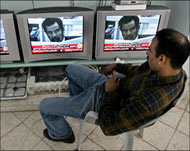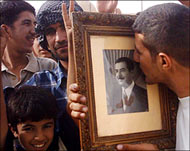Iraqis sound off on Saddam’s trial
The televised trial of former Iraqi president Saddam Hussein has done little to allay ordinary Iraqis’ security concerns while further polarising public opinion.

Some Iraqis seemed indifferent about Saddam being brought to court on 19 October to face charges of killing up to 148 Shia Arabs in Dujail in the Salah al-Din province, 60km north of Baghdad.
They went about their business, some simply watching TV while playing dominoes in cafes around the country.
“So what?” a retired teacher in a cafe in downtown Baghdad said. “It is not our top concern now. What we really need now is security.”
Saddam and seven defendants, two of whom were close aides, could face the death penalty if convicted over the alleged 1982 massacre in Dujail.
On Wednesday, after presiding judge Rizgar Muhammad Amin, a Kurd, read the defendants their rights and the charges against them, which also include forced expulsions and illegal imprisonment, he asked each for their plea.
Saddam refused to acknowledge the legitimacy of the court but entered a plea of not guilty nonetheless.
Situation worsening
Abu Jawad, a 65-year-old who lives in an abandoned military camp in Baghdad, was singing an old Iraqi song called Doctor.
“Leave the old wound, doctor/Treat the new one that your eyes can see well,” he sang, pointing to the new situation in Iraq which he believes has worsened since Saddam was president.
Then he started swearing at Saddam in a southern dialect, calling him a killer.
 |
|
Some saw the televised trial as |
A group of young high school girls shed tears when they heard the former leader’s voice rejecting the legitimacy of the Iraqi court trying him.
One of them, 17-year-old Shahad, remarked that although she hated him for killing so many Shia relatives of hers in Najaf, she still thinks he should not have been ousted from power by a foreign force. Some members of her family had fled to Denmark for a safer life, but now they cannot come back because conditions are worse than before.
Um Ali, a middle-aged woman who fled Basra at the time of the Iraq-Iran war in the 1980s, believes Saddam’s trial is a means to humiliate all Iraqis. “It would have been pleasantly accepted if his trial was held at another time and another place,” she said.
Justice served
Doubtless, most Iraqis believe Saddam should face the fate he had made so many of his opponents face.
“Americans or not,” said Abd al-Hussain, a shopkeeper in Kadhimiya, “let him get the penalty of Allah for his doings.”
Muhammad Farhan Al Dulaimi, a taxi driver who was once an army officer sacked by Saddam because his cousin was accused of treason and executed, was outraged that Saddam and the co-defendants were not allowed to wear traditional Arab garb.
“He and Awad Al Bandar ordered the execution of many of my relatives and colleagues, but the scene of them without their agals (Arabian head covers) makes one’s blood boil. They should have left him for us to deal with when all this mess is over.”
Some Iraqis complained the timing of the trial was rushed and that there was no court building ready, forcing the trial to be held in one of Saddam’s former palaces inside the fortified Green Zone.
Wrong timing?
A political science professor, who refused to give his name for security reasons, criticised the timing of the session. He insisted that Iraqis should concentrate on building a political structure for their country and postpone any sensitive issues to a time when stability and security are the norm.
Former Iraqi prime minister Iyad Allawi also criticised the trial, calling it disorganised.
 |
|
Iraqis in Tikrit demanded |
In an interview with the Iraqi Sharqiya satellite channel from his home in Jordan, Allawi criticised the way the trial was broadcast, saying it should have been either transparent and open to the public, or closed with attendance of human-rights organisations.
Meanwhile, demonstrators in Dujail demanded Saddam be handed down a death penalty.
In Saddam’s hometown of Tikrit, it was a different scene with many demanding his immediate release and referring to him as the legitimate president of the Iraqi republic.